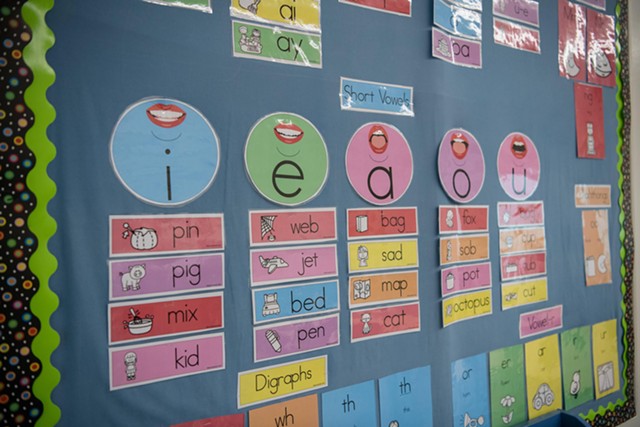
- File: Daria Bishop
- A bulletin board at Vergennes Union Elementary School
S.204 takes two small but potentially significant steps: It calls for schools to identify students who may have reading difficulties in the early elementary years. And it mandates literacy-focused professional development for all licensed teachers.
The legislation requires all public schools and approved independent schools to screen students in grades kindergarten through third grade for reading deficits using short, easy-to-administer assessments known as universal screeners. Screeners measure a variety of literacy skills including phonemic awareness, or the ability to identify the sounds in words; letter naming; letter-sound correspondence; spelling; and handwriting. The vast majority of states already require this type of screening.
Under the bill, schools would have to provide students who are behind in reading with "evidence-based" instruction and notify parents of potential deficits within 30 days. The bill prohibits schools from using "instructional strategies that do not have an evidence-base, such as the three-cueing system."
Three-cueing encourages children to figure out words based on picture or context clues rather than by sounding out letters. But the system has come under fire in recent years after a popular American Public Media podcast, "Sold a Story," laid out the ways in which the approach strays from science. Last year, eight states explicitly banned the practice.
Related Teachers' Union Raises 'Significant Concerns' About Dyslexia Screening Bill

Teachers' Union Raises 'Significant Concerns' About Dyslexia Screening Bill
Education
When it comes to third graders, only about half demonstrated proficiency on last year's Vermont Comprehensive Assessment Program, the state's new language arts assessment. Seven Days detailed students' declining reading performance in a cover story last year.
Related Too Many Vermont Kids Struggle to Read. What Went Wrong — and Can Educators Reverse a Yearslong Slide in Literacy?

Too Many Vermont Kids Struggle to Read. What Went Wrong — and Can Educators Reverse a Yearslong Slide in Literacy?
Education
In an earlier draft, the bill said teachers would be required to complete a 45-hour, six-module online course that the Agency of Education developed using federal Elementary and Secondary School Emergency Relief funds. The agency paid Public Consulting Group, a Boston-based firm, $2.1 million to develop the course, "Building a Strong Foundation for Lifelong Literacy Success." Half a million dollars in ESSER funds were also used to create an online platform, known as Pepper, for educators to access professional learning.
Last month, Colchester School District superintendent Amy Minor told lawmakers that she had completed the first module of the course and had concerns about the way the information was delivered and whether it would actually help.
Several Vermont teachers who completed one or two of the modules told Seven Days that they also found the online format lacking. The educators said teachers need opportunities to discuss what they are learning with others, apply it in a classroom setting and get feedback.Last month, Colchester School District superintendent Amy Minor told lawmakers that she had completed the first module of the course and had concerns about the way the information was delivered and whether it would actually help.
In recent weeks, the bill was amended to allow for other state-approved literacy-related professional development. If the bill passes, the Agency of Education said it will release a list of approved professional development in the fall.
Minor, who is also president of the Vermont Superintendents Association, told legislators last month that a committee of paid teachers, curriculum coordinators and administrators should work with the state to create that list in order to "generate buy-in and create opportunities to strengthen the relationship between the field and the Agency of Education."
It is still unclear from the bill whether all educators, even those who teach subjects unrelated to literacy, such as physical education, would be required to complete literacy-related professional development or if some teachers would have to do more than others.
The literacy bill now heads to the Senate Appropriations Committee. Rep. Peter Conlon (D-Cornwall), chair of the House Education Committee, said his committee plans to take up the bill later in the session.
Minor, who is also president of the Vermont Superintendents Association, told legislators last month that a committee of paid teachers, curriculum coordinators and administrators should work with the state to create that list in order to "generate buy-in and create opportunities to strengthen the relationship between the field and the Agency of Education."
It is still unclear from the bill whether all educators, even those who teach subjects unrelated to literacy, such as physical education, would be required to complete literacy-related professional development or if some teachers would have to do more than others.
Sen. David Weeks (R-Rutland) voted in favor of the bill on Tuesday but said he was concerned that the professional development requirement for teachers was not well defined.
"It’s a little fuzzy," Weeks said. "If it hits a speed bump, that’s the speed bump it’s going to hit."
"It’s a little fuzzy," Weeks said. "If it hits a speed bump, that’s the speed bump it’s going to hit."
The literacy bill now heads to the Senate Appropriations Committee. Rep. Peter Conlon (D-Cornwall), chair of the House Education Committee, said his committee plans to take up the bill later in the session.











Comments
Comments are closed.
From 2014-2020, Seven Days allowed readers to comment on all stories posted on our website. While we've appreciated the suggestions and insights, right now Seven Days is prioritizing our core mission — producing high-quality, responsible local journalism — over moderating online debates between readers.
To criticize, correct or praise our reporting, please send us a letter to the editor or send us a tip. We’ll check it out and report the results.
Online comments may return when we have better tech tools for managing them. Thanks for reading.